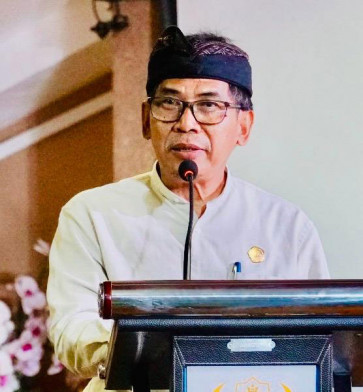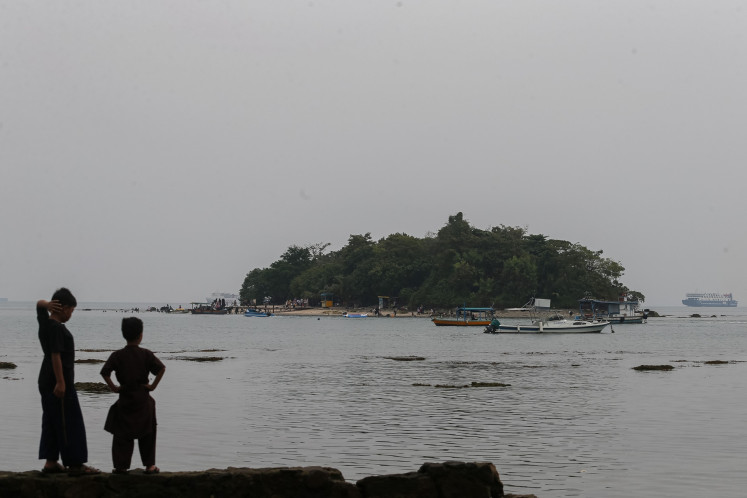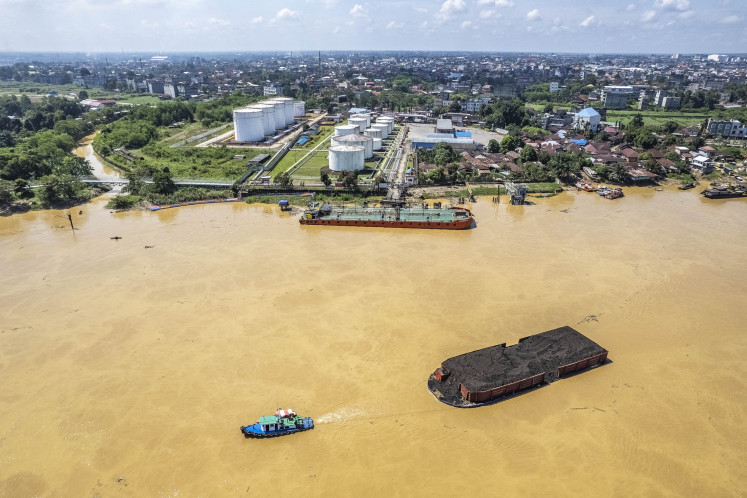Popular Reads
Top Results
Can't find what you're looking for?
View all search resultsPopular Reads
Top Results
Can't find what you're looking for?
View all search resultsKPU wants candidacy ban for former graft convicts
Johan Budi (JP/Seto Wardhana)The General Elections Commission (KPU) opened its first hearing with the newly installed House of Representatives with an old issue: whether former graft convicts should be allowed to run in an election, specifically the 2020 simultaneous regional elections
Change text size
Gift Premium Articles
to Anyone

Johan Budi (JP/Seto Wardhana)
The General Elections Commission (KPU) opened its first hearing with the newly installed House of Representatives with an old issue: whether former graft convicts should be allowed to run in an election, specifically the 2020 simultaneous regional elections.
The KPU drafted a regulation in 2018 that included a ban on former graft convicts from running in the 2019 general election. The draft regulation led to a prolonged dispute with the previous batch of lawmakers, which criticized the elections body for overstepping its authority.
Despite the lawmakers' vigorous objections, the KPU had persisted in issuing the regulation. It was eventually repealed by the Supreme Court in September 2018, after several former graft convicts filed a petition for judicial review.
KPU chairman Arief Budiman said the commission decided to add a similar clause to the draft KPU regulation (PKPU) on regional election candidates, because of the broad powers of regional heads.
“In a regional election, the individual who is elected will be the leader of that particular region. Our hope is that this one person should be the best person [to lead], not just someone who is capable of carrying out the duties of the office, but someone who will be a role model for the people he is leading,” Arief said on Monday on the sidelines of a meeting with House Commission II overseeing home affairs.
While several Commission II members reiterated some of the same objections raised last year, a few lawmakers seemed more open to the candidacy ban for graft convicts than their predecessors.
Freshman lawmaker Kamrussamad of the Gerindra Party said the regulation should give greater prominence to the election ban on graft convicts.
The draft clause states that candidates running for governor, deputy governor, regent, deputy regent, mayor or deputy mayor must not be “former convicts of drugs, sexual crimes against children or corruption”.
“We know that the public sees corruption as one of the key determinants of successful government, both at the national and regional levels. The House has also been in the spotlight regarding this issue in the last few months,” Kamrussamad said at the meeting. “If we are sensitive to this condition, then the term ‘former graft convict’ should be placed at the beginning, before ‘former drug dealer’ and the rest.”
He added that doing so would show that the KPU was strongly committed to “the emergence of regional heads that possess integrity”.
Johan Budi from the Indonesia Democratic Party of Struggle (PDI-P), another freshman lawmaker and former spokesperson of the Corruption Eradication Commission (KPK), said that he also supported the ban, with one caveat.
“Personally, I agree that former graft convicts should not be [election] candidates,” Johan said at the meeting. “But this clause should be examined so that it doesn’t reignite controversy.”
Other lawmakers were less supportive. Agung Widyantoro and Zulfikar Arse Sadikin of the Golkar Party, as well as Wahyu Sanjaya of the Democratic Party, opposed the clause. They said it contradicted the 2016 Regional Elections Law that banned only those convicted of drug offenses and sexual violence against children.
_______________
“Personally, I agree that former graft convicts should not be [election] candidates.”
Former KPK spokesperson Johan Budi
______________
“Who has given the KPU the authority to be a judicial institution? If someone has completed their sentence, then they should be allowed [to run] unless the courts revoked their political rights,” said Wahyu. “Like it or not, democracy is about who gets the most votes, regardless of what has personally happened [to the candidate].”
Arief told lawmakers that since former graft convicts were not allowed to run for president or vice president, the KPU had reasoned that this provided a legal basis for banning former graft convicts.
“So we are just taking provisions from existing election laws,” he said.
Arief added that the 2018 regional elections had disproved some arguments against the candidacy ban.
“The previous argument was that former graft convicts should be allowed to run because voters would not elect them anyway. But the fact is that even a regional head candidate that was a suspect in an ongoing graft case won the election, despite the fact that he was clearly unable to govern,” said Arief.
He was referring to Ahmad Hidayat Mus, the former regent of the Sula Islands who won his bid for the North Maluku governorship in 2018.
The KPK named Ahmad a suspect in a graft case on land acquisition for a Sula Islands airport project in March 2018, three months before the regional elections. While Ahmad won the most votes, he was never inaugurated and was instead found guilty of corruption and sentenced to four years in prison.
Arief also mentioned several former graft convicts who won in the 2018 elections and had since been implicated in other graft cases.
One such elected official was Muhammad Tamzil, the nonactive regent of Kudus, who was arrested in June during a KPK raid. Tamzil had previously served a 22-month sentence for a 2003 graft conviction during his first term as Kudus regent.









